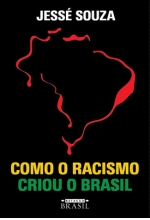Promise of explanation — Érica Maria Delfino Chagas’s (UNIT/CONMEA) review of “Como o racismo criou o Brasil”, by Jessé Souza

Abstract: Jesse Souza’s work, Como o racismo criou o Brasil explores the role of racism in the development of Brazilian society, highlighting its effects on social, political, and moral fronts. Souza, an academic writer, provides a perceptive and insightful critique that ignites discussion on racial matters in Brazil.
Keywords: Brazilian society creation, racism, and multifaceted racism.
In his book Como o racismo criou o Brasil, Jesse Souza examines the impact of racism on Brazilian society. With a solid academic background, Souza aims to elucidate the intricate nature of racism, moving beyond mere recognition of its existence to understanding it as a crucial element in the development of Brazilian society and a significant contributor to the country’s social, political, and moral issues. The book, published by Estação Brasil in 2021, spans 304 pages.
 Jesse Souza is a professor at the Federal University of ABC. He holds a Ph.D. in Sociology from the University of Heidelberg (Germany), a Master’s in Sociology, and a Law degree from the University of Brasília (UnB). In this book, he compiles theses from over 40 years of study, highlighting the last 25 years of uninterrupted empirical research on Brazilian society. The book is divided into three parts, with the first containing four texts, the second containing eight, and the third and most extensive containing fourteen. In addition, there is a preface, conclusion, and notes.
Jesse Souza is a professor at the Federal University of ABC. He holds a Ph.D. in Sociology from the University of Heidelberg (Germany), a Master’s in Sociology, and a Law degree from the University of Brasília (UnB). In this book, he compiles theses from over 40 years of study, highlighting the last 25 years of uninterrupted empirical research on Brazilian society. The book is divided into three parts, with the first containing four texts, the second containing eight, and the third and most extensive containing fourteen. In addition, there is a preface, conclusion, and notes.
The book opens with a preface by Souza, in which he briefly outlines the intended direction of the work and expresses gratitude to those who contributed to it.
The first section, titled ‘What Exactly is Racism?’, serves as an appropriate introduction for a book addressing the genesis of Brazil through racism. The text discusses four topics related to racism in Brazil, including its evolution, its relationship with morality, and critiques of concepts such as ‘place of speech’ and ‘representation.’ Souza argues that these terms are used to silence oppressed groups while allowing a select few to speak on their behalf, ultimately masking the reality of racism and societal operations. This selective visibility hinders the effective understanding and addressing of racism.
This section critiques Djamila Ribeiro’s popularization of the term ‘place of speech’ in a best-selling book. However, the author connects this critique to a broader argument, labeling such concepts as part of a ‘neoliberal scam,’ as titled: ‘It Seems Like Emancipation, but It’s Just a Neoliberal Scam: On ‘Place of Speech,’ ‘Representation,’ and Related Terms’ (p.x).
The author’s exploration of ‘racism’ lacks sufficient clarification. When introducing the central thesis of the book on page 27, the term confuses rather than clarifies. Although the author briefly touches upon ‘multidimensional racism’ in the preface and main thesis, the use of terms such as ‘racial racism,’ gender, class, and cultural racism lacks clear definition.
The titles of the first part complement each other, providing a foundation for the content of the second part. They stimulate reflection and are well-written, emphasizing the significance of comprehending the subtleties of racism.
In the second section, we explore the correlation between racism and morality, power, physical and mental well-being, and Western religions. Souza contends that morality is essential in perpetuating racism within families and other institutions, classifying individuals as superior or inferior. This dichotomy extends beyond race to include gender, social class, and culture.
Despite the coherent argument, the section lacks sources and references, particularly regarding Western religious practices. Souza acknowledges the ambitious journey through over three millennia of history, which complicates source citation. Although the shortest, this section is dense and challenging, contrary to Souza’s initial claim of accessibility to all interested readers. However, it provides a strong basis for the final section.
The concluding paragraphs focus on current issues of racism in Brazil, supporting the thesis of multidimensional racism. Souza’s titles cover a wide range of global and specific instances of racial discrimination in Brazil, linking societal behaviors and morality to racism. This section emphasizes Souza’s frank discussion of Brazil’s racist social structure.

The book effectively dissects racism in a multifaceted manner and offers insights into its destructive impact. It is highly recommended for professionals and students in the social sciences, political activists, and those engaged in social and racial justice movements. However, it is important to note that a deeper understanding of the subject matter may be necessary.
Summary of Como o racismo criou o Brasil
- Prefácio
- I. O que é racismo, afinal?
- 1. Parece emancipação, mas é só uma fraude neoliberal: sobre “lugar de fala”, “representatividade” e afins
- 2. O sequestro da linguagem da emancipação
- 3. Afinal, onde está a estrutura do “racismo estrutural”?
- 4. A moralidade como fundamento da vida social e de todo racismo
- II. A singularidade da moralidade no ocidente
- 5. O judaísmo antigo
- 6. O nascimento do cristianismo
- 7. A revolução protestante
- 8. A moralidade pós-religião
- 9. A luta pelo reconhecimento social
- 10. A semente hegeliana
- 11. O reconhecimento social como motor das lutas políticas
- 12. Entre moralidade e racismo
- III. O racismo multidimensional
- 13. O racismo global
- 14. Do racismo científico ao culturalismo que ainda tenta não ser racista
- 15. Um novo racismo para um novo império: o racismo cultural
- 16. As bases racistas da nova ciência mundial americana
- 17. O racismo cultural dos povos colonizados
- 18. A crítica ao culturalismo
- 19. Por uma teoria crítica e não racista do mundo contemporâneo
- 20. O amálgama entre racismo de classe e de raça: a criação do burguês, do trabalhador e do marginal
- 21. O racismo racial no comando da sociedade brasileira
- 22. A ideologia do branqueamento
- 23. O contraponto antirracista e a revolução de Vargas
- 24. A metamorfose do racismo em falso moralismo anticorrupção
- 25. O aprendizado interrompido: Diretas Já, o impedimento de Collor e a construção do PT encampando o falso moralismo
- 26. Bolsonaro e a explosão do racismo popular brasileiro
- Conclusão
- Notas
Reviewer
 Érica Maria Delfino Chagas has a master’s degree in Direitos Humanos from the Programa de Pós-Graduação em Direitos Humanos da Universidade Tiradentes (PPGD/UNIT). She has a degree in Direito from Universidade Tiradentes (UNIT). he works as a legislative advisor to the Conselho Municipal de Educação de Aracaju (CONMEA) and a member of the Coletivo Negro Yibambe (CNY). Among other texts, she wrote: A coisa está ficando preta: uma análise e contraposição entre o direito de corpos negros e corpos negros no Direito. Social media: Instagram: @ericadelfino. ID: LATTES: http://lattes.cnpq.br/7114449553122578. ID: ORCID: https://orcid.org/0000-0001-8433-9949. E-mail: ericamdelfino@gmail.com.
Érica Maria Delfino Chagas has a master’s degree in Direitos Humanos from the Programa de Pós-Graduação em Direitos Humanos da Universidade Tiradentes (PPGD/UNIT). She has a degree in Direito from Universidade Tiradentes (UNIT). he works as a legislative advisor to the Conselho Municipal de Educação de Aracaju (CONMEA) and a member of the Coletivo Negro Yibambe (CNY). Among other texts, she wrote: A coisa está ficando preta: uma análise e contraposição entre o direito de corpos negros e corpos negros no Direito. Social media: Instagram: @ericadelfino. ID: LATTES: http://lattes.cnpq.br/7114449553122578. ID: ORCID: https://orcid.org/0000-0001-8433-9949. E-mail: ericamdelfino@gmail.com.
To cite this review
SOUZA, Jessé. Como o racismo criou o Brasil. Rio de Janeiro: Estação Brasil, 2021. 304 p. Review by: CHAGAS, Érica Maria Delfino. Promise of explanation. Crítica Historiográfica. Natal, v.4, n.15, jan./feb., 2024. Available at <https://www.criticahistoriografica.com.br/en/promise-of-explanation-erica-maria-delfino-chagass-unit-conmea-review-of-como-o-racismo-criou-o-brasil-by-jesse-souza/>.
© – Authors who publish in Historiographical Criticism agree to the distribution, remixing, adaptation and creation based on their texts, even for commercial purposes, as long as due credit for the original creations is guaranteed. (CC BY-SA).








